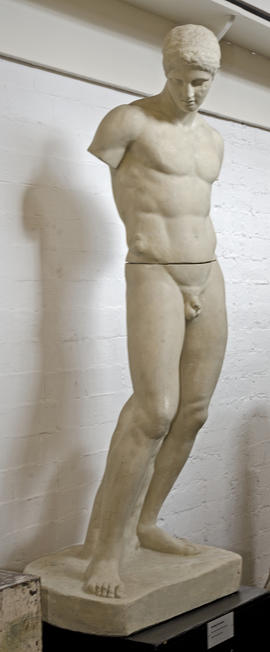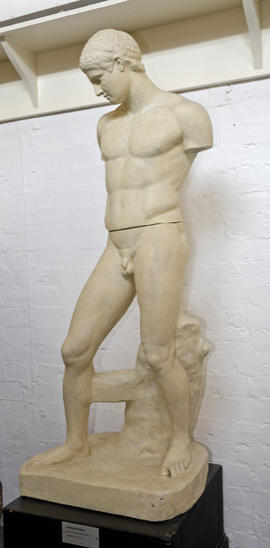Key Information
Reference code
Title
Date(s)
- 19th century (Creation)
Level of description
Item
Extent
1 item
Content and Structure
Scope and content
Original: Discovered in 1781 on Esquiline Hill. Considered to be a copy of an earlier Greek original. The popularity of the sculpture in antiquity was no doubt due to its representation of the athletic ideal. Discus-throwing was the first element in the pentathlon, and while pentathletes were in some ways considered inferior to those athletes who excelled at a particular sport, their physical appearance was much admired. This was because no one particular set of muscles was over-developed, with the result that their proportions were harmonious. Listed in the first catalogue of casts as Greek, located in Vatican and bought from Brucciani. Original currently in the collection of the Louvre, Paris, France.
Photographed in GSA 1915.
Appraisal, destruction and scheduling
Accruals
System of arrangement
General Information
Name of creator
Archival history
Exhibited: The Savoy Tower, Glasgow 19 April 2018-07 May 2018 for 'Material Objects (work by Anthony Brotheridge, GSA Textile Design Tutor and Ruth Switalski)' exhibition. This item is currently on display in The Glasgow School of Art's Reid Building. For access information please email archives@gsa.ac.uk.
Custodial history
Listed in 1964/5 inventory as located in classroom 38 of the Mackintosh Building (GSAA/GOV/7/5). Listed under 'Statues' in 'Catalogue of Books, Casts etc. of the School of Ornamental Art, Glasgow' (GSAA/GOV/7/1).
Physical Description and Conditions of Use
Conditions governing access
Conditions governing reproduction
Language of material
Script of material
Language and script notes
Physical Description
Dimensions: 1720 x 730 x 490 mm (Plinth 520 x 680 x 680 mm)



